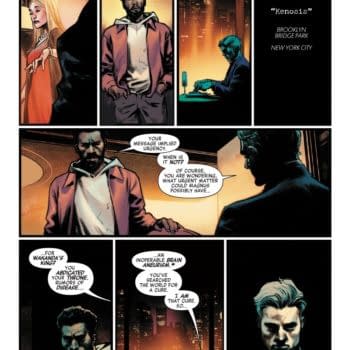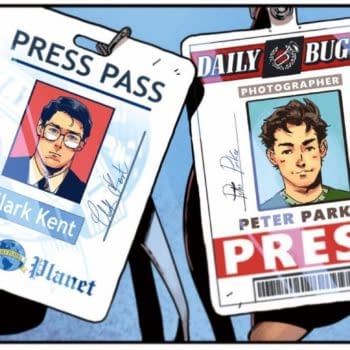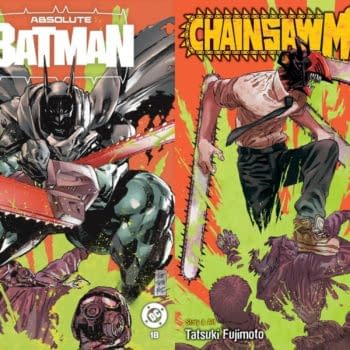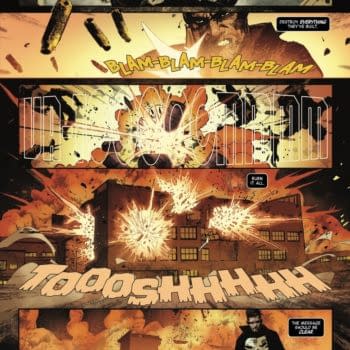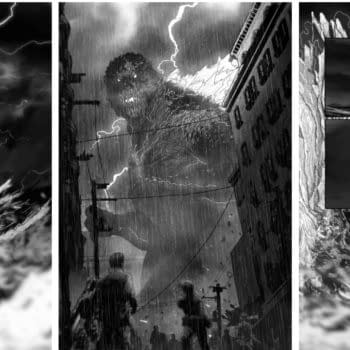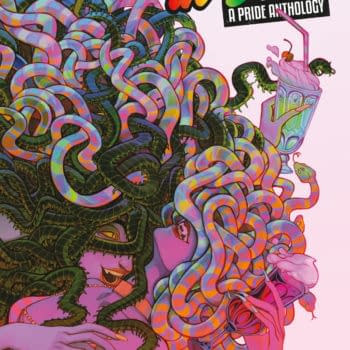Posted in: Comics | Tagged: alex de campi, Dan Braun, dark horse, evan dorkin, greg rucka, NYCC, tim seeley
Dark Horse Draws On Your Horror At New York Comic Con

Dark Horse rounded up its horror writers for an extra-creepy panel on Friday morning at New York Comic Con, and Scott Allie, who "loves horror comics", asked "are you setting out to create scares or do you think that horror comics are about something else?"
Alex de Campi says that Grindhouse "doesn't work the way a slasher film works because the reader chooses their own pace as they go through the book". You have to find things that you didn't necessarily think about something as scary before, says de Campi, who calls herself "squeamish" personally. "We have a very specific knowledgeable audience for Grindhouse", de Campi explains, "and there are some things that we think up that are comics code moments". When asked how much the comic contains of "comics code moments" in interviews, she replies, "How much time do you have?"
Greg Rucka says, "I love the inevitability of horror. I'm a guy who thinks Doctor Faustus is great horror". "When all the pieces are laid out right, and I'm not saying I'm doing it right, but when you get all the dominoes in the right place and knock it over. Then you realize, here's a guy who wandered into a situation for all the right reasons, but now he gets to live in misery. That kind of horror appeals to me". He's looking toward "revelatory horror" on the newly announced series Veil, especially in the first 5 issues.
Evan Dorkin says everyone's looking for a version of a story they know to sell in horror films and shows these days, or projects are working hard to sell an action figure.
The panelists all agreed that horror writers tend to be the most "chicken shit" in themselves, and are spending time trying to work out their fears and the nature of fear. The possibly unstoppable "human element" is more horrific than monsters, the panelists agreed, and based on "human connection", there's scare rather than just "shock".
De Campi describes herself as fundamentally a noir writer, but her definition of horror focuses on character, following their nature until they are "fucked and can't get out". When they just keep going "further in", that's what's "fun" for de Campi, like noir for her but "even darker".
Tim Seeley used to watch "Fright Night", and the first horror film he saw portrayed a girl with giant vampire teeth, and when it kept him up all night he realized that when you're scared, you make stuff up. It becomes your own narrative. Now he likes drawing "things with teeth".
Dorkin says that if you watch the original The Haunting original film and its later incarnations, you see what works and what doesn't. The modern remake, a "piece of shit", according to Dorkin, and "almost all budgeted horror sucks". Dorkin's never had an "aha" moment about horror, since he mainly does humor, but his "aha" moment was when Allie offered him money to do horror. Working with Dark Horse has given him more opportunities to expand into genres. Jill Thompson's attitude towards horror is that she's "super squeamish", so there's plenty of horror in Beasts of Burden that you don't actually see, but infer from detail if you pay attention. There's no violence shown sometimes, but that's the "stuff that gets under your skin".
Dorkin's "free floating anxiety" about parenting has extended to Beasts of Burden, worrying about bad things happening. Rucka commented that it's brave of Dorkin to do that, and agrees that horror writers "scare ourselves much more than we scare you" (the audience).
Dan Braun comments that changes between childhood and adulthood alter the nature of fear sometimes, and that adult fears can be even greater than "shadows" in childhood. Braun often works on "suspenseful stories" in a short format where you "don't often have time to tell it" and it's a challenge.
Horror's not the only place for suspense, declares Dorkin, explaining that suspense is there in Watchmen, in Batman: Year One, and now in Locke & Key. Using "explosions" in various genres is not suspenseful, there's "light" but not "heat" according to Dorkin.
If you watch a movie where characters are actually considering their actions and not just getting "battered around", Dorkin says, but then "fucked again when they do the right thing". "Who the fuck goes into their basement to get a pitchfork and a flashlight?", he asks, but people who do the "right thing" but the "end is unconquerable", that is great suspense.
"I think you can do much scarier things to a character than kill them", de Campi challenged, when the panelists started discussing death versus transformation for characters, when they turn into monsters. Most panelists felt death was worse than changing into a monstrous being.
Rucka says that "tension doesn't matter at all unless you care about the characters involved". Lovecraft's "Shadow Over Innsmouth" is an excellent example, a Merchant Ivory film, which is pastoral, but shocking.
During Q &A, eerie phone ring tones played out, prompting some amusement. A fan asked what kind of narrative techniques they use to engage with characters when they are going to die in the narrative.
Rucka's prompt reply was "emotionally honesty. This character shares your experience of standing alone in the dark and the cold. You can fake emotion. There's a lot of narrative shorthand in early comics, where in a few panels, emotional connections are established, but something needs to happen to make the reader believe that".
A fan asked whether the creators use actual nightmares in their work. Braun finds them a "deep well of inspiration, if you remember them". Dorkin says you wake up and do your work. He often has dreams where he has written or drawn something and then wakes up to find he hasn't yet with an "oh shit".
Allie ran through some images at the end of the panel, one for The Strain by Guillermo del Toro, currently in Dark Horse Presents. Also Grindhouse from issue #2, and a reveal on posters being made for Grindhouse, available at the Dark Horse booth at NYCC. Out October 30th is a short adaptation of "The Raven" by Poe and Richard Corben. The EC archives are on the way, the first volume of which comes out the 23rd of October. The audience was treated to the cover and first couple pages of The Veil, cover to the first issue of Bad Blood, which has "no sparkly vampires". Allie reminded that October 23rd brings a new Hellboy graphic novel, more Abe Sapien is on the way, and B.P.R.D. Hell on Earth. Baltimore, and Kiss Me, Satan are two big titles Dark Horse are excited about right now.










